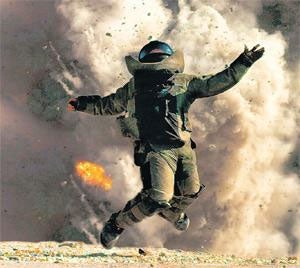Geoffrey MacNab: A rich year for British film-making
The great relief was that the evening wasn't all about <i>Avatar </i>after all

The question was whether last night's Orange British Academy Awards would provide at least smatterings of resistance against the all-powerful Avatar. James Cameron's 3-D epic is the highest grossing movie of all time and is being widely tipped to win a hatful of Oscars. This didn't mean that Bafta voters were obliged to genuflect before it.
In the event, Bafta resisted Avatar's hegemonic pull and laid down a marker for the Oscar voters in the process by giving the Best Film award and the Best Director award to The Hurt Locker.
This really was a case of a pygmy slaying a giant. The film, brilliantly directed by Cameron's ex-wife Kathryn Bigelow, was made outside the studio system for $15m (£9.7m). That is roughly $285m less than Cameron is reported to have spent on his magnum opus
It would have been a little dismaying if Cameron's bravura fairground ride of a movie, dominated by computer generated imagery but with wafer-thin characterisation, had triumphed over all those lovingly crafted independent films pitted against it.
Bigelow's The Hurt Locker had everything running against it. When the film premiered at the Venice Film Festival a small eternity ago in the summer of 2008, it didn't even have a US distributor on board. It was part of a genre – the Iraq war movie – that had previously proved to be box-office poison. This was a sweaty and claustrophobic drama about bomb squad technicians – three members of of the US army's élite Explosive Ordnance Disposal Squad. A feel-good movie it wasn't.
However, its success was a triumph for old-fashioned film-making. Next to Avatar it was a chamber piece, but Bigelow was able to crank up the tension just as effectively as her former husband, whose movie only won awards in the technical categories.
The Bafta awards are sometimes criticised for being too oriented toward US movies. What was evident from last night's event was how rich a year it has been for British film-making and for British actors. Carey Mulligan, unknown a year ago, underlined her status as Britain's fastest rising star by winning the Leading Actress award for An Education. Colin Firth beat off a very rich field including Jeff Bridges as the broken down country and western singer to win the Best Actor award.
For once, the films in the running for Outstanding British Film were a match for those in the Best Film list. (An Ediucation featured in both.) Although Andrea Arnold's Fish Tank won, no one could have begrudged the award going to any of her four rivals. Duncan Jones, David Bowie's son, likewise beat off some high calibre competitors to win the award for Outstanding Debut by a Brit.
There were some surprising decisions. Jacques Audiard's prison drama A Prophet is a fine film but it is surely not on the level of Michael Haneke's magisterial The White Ribbon. Christoph Waltz deservedly won a Supporting Actor award his turn as the villainous, Richard III-like Nazi in Inglourious Basterds. The Supporting Actress Bafta that went to Mo'Nique for her role in Precious: Based on the Novel Push by Sapphire was also a popular decision.

Watch Apple TV+ free for 7 day
New subscribers only. £9.99/mo. after free trial. Plan auto-renews until cancelled.
ADVERTISEMENT. If you sign up to this service we will earn commission. This revenue helps to fund journalism across The Independent.

Watch Apple TV+ free for 7 day
New subscribers only. £9.99/mo. after free trial. Plan auto-renews until cancelled.
ADVERTISEMENT. If you sign up to this service we will earn commission. This revenue helps to fund journalism across The Independent.
Bafta organisers like to see their event as the "pre-eminent" film awards ceremony outside the Oscars. Their challenge is to deliver a show with enough Hollywood stardust to capture a big popular audience without compromising its local British identity. Last night, they just about managed it. The great relief was that the evening wasn't all about Avatar after all. However, it is hard to see next month's Academy Awards following in quite the same path.
There, you feel, Cameron's juggernaut is likely to be back on the road. Whether Mulligan and Firth will be able to repeat their Bafta success is also open to question.
Join our commenting forum
Join thought-provoking conversations, follow other Independent readers and see their replies
Comments
Bookmark popover
Removed from bookmarks